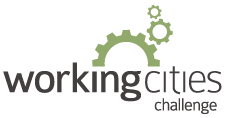Danbury Awarded Working Cities Challenge Grant
Grant from the Boston Federal Reserve to Focus on Economic Development
DANBURY, Conn. (March 15, 2017) — Improving the lives of low-income Danbury residents is the purpose of new funding awarded to the city by the Boston Federal Reserve. Called the Working Cities Challenge Grant, it was awarded to a collaborative team led by the United Way of Western Connecticut (UWWC) and Community Action Agency of Western Connecticut (CAAWC).
The Working Cities Challenge design grant of $15,000 will help the collaborative create a plan that will make the city eligible for a much larger grant of up to $500,000. Ten of 16 eligible cities were awarded the grant. The funding is part of a broader initiative by the Boston Federal Reserve to promote economic growth throughout cities in Connecticut and New England. The ten winning design cities are: Bridgeport, Danbury, East Hartford, Hartford, Middletown, New Britain, New Haven, Norwich, Torrington, and Waterbury.
“This grant opens the door to finding new ways that we can all work together in the city of Danbury to lift up and improve the lives of our low-income residents,” said Kim Morgan, CEO of UWWC. “Our goal is to dramatically reduce under and unemployment of people who are struggling—particularly people of color and immigrants.”
“Many low-income residents need assistance in becoming self-sufficient,” said Michelle James, Executive Director of CAAWC. “Employment and education are a means for these residents to achieve their dreams.”
While the details of the plan will be determined during this design phase, the focus will be on job training in the areas of childcare, healthcare, and manufacturing. These are three sectors identified by the collaborative team as having the greatest need for qualified workers. To increase the pool of potential employees in these sectors, the plan will create strategies to tear down barriers to employment—such as limited education, English language skills, transportation and childcare.
While programs exist in the city to help low-income residents acquire high school diplomas, job training, and language skills, there is little coordination among programs, and residents often have difficulty accessing those programs because of transportation issues and/or a lack of childcare. The design funds will be used to develop a plan to address those issues.
The grant is especially welcome in Danbury, where the foreign-born population has grown to 32%, many of whom do not have a high school diploma, and 50% of whom earn less than $35,000 per year. The child poverty rate has grown from 6% in 2007 to 21% in 2015. The plan developed through these grant dollars will focus on turning these earnings and poverty statistics around.
The collaborative brought together people from the fields of education, business, and social services, to identify the greatest needs and the best ways to address economic challenges. Low-income and immigrant residents were also part of the team that put the successful proposal together. Core partners moving forward include the City of Danbury, CityCenter Danbury, Danbury Public Schools, Naugatuck Valley Community College, Connecticut Institute for Communities, Western Connecticut State University, Western Connecticut Health Network, Tribuna, and the Greater Danbury Chamber of Commerce.
To gather more information from the community to develop the design of the plan, the collaborative will seek input through community conversations, surveys, one-on-one conversations, and the local media.
To find out more about the Working Cities Challenge Grant and how to get involved, contact Kim Morgan at United Way of Western Connecticut at (203) 792-5330 or Michelle James at the Community Action Agency of Western Connecticut at (203) 744-4700.
###
ABOUT UNITED WAY OF WESTERN CONNECTICUT
United Way of Western Connecticut (UWWC) helps residents across Northern Fairfield County, Southern Litchfield County and the City of Stamford by focusing on the vital building blocks for a good life: Education, Financial Stability and Health. Our mission is to improve lives by mobilizing the power of caring communities to create lasting change. We are committed to ensuring that every child enters school ready to learn, every family is financially stable, and every community we serve is healthy and strong. We are particularly focused on a population that United Way identifies as ALICE® (Asset Limited, Income Constrained, Employed) in our communities. A United Way report published in October 2016 revealed that in Connecticut, more than 1 in 4 households has earnings above the Federal Poverty Level, but below a basic cost-of-living threshold. Combined with those who are struggling below poverty level, 38% of all households in the state are experiencing financial hardship. By leveraging the collective power of the community, we are focused on creating an environment where individuals and families are self-sufficient and can achieve financial independence. For more information about United Way of Western Connecticut, please visit: www.uwwesternct.org. Like us on Facebook. Follow us on Twitter. Follow us on Instagram. Watch us on YouTube.
ABOUT COMMUNITY ACTION AGENCY OF WESTERN CONNECTICUT
The Community Action Agency of Western Connecticut, Inc. (CAAWC) provides social services and programs to low-income individuals and families in the Fairfield and Litchfield counties in Connecticut to help families stabilize and improve their lives. CAAWC’s approach to the provision of services follows the Human Services Infrastructure (HSI) model – “no wrong door.” No matter how a client enters the agency, staff approaches the situation holistically to ensure services and resources needed to help the client resolve their issue(s) are identified. This is a client driven model and CAAWC staff is supportive in providing internal support services or linking the individual or family to other community services.

